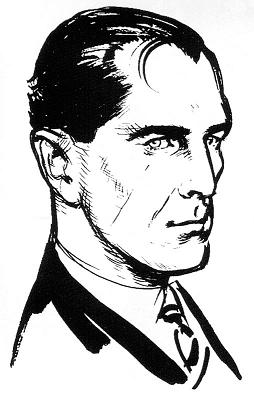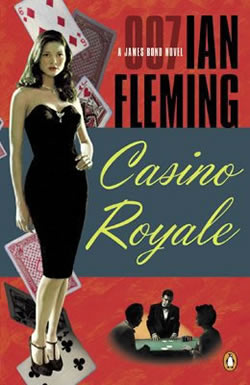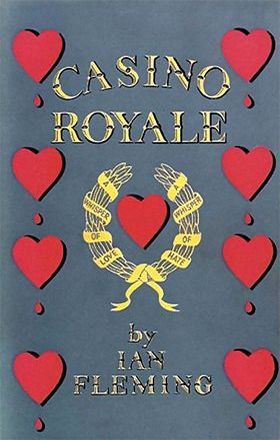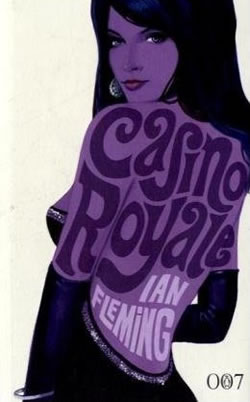Casino Royale (1953): The birth of a hero and the birth of a style

The Hero
The first novel wastes no time in introducing James Bond to the readers. We meet the secret agent at a roulette table in the casino at Royal-les-Eaux, a small but reasonably wealthy coastal town in France. It is the wee hours of the morning and the fatigue is winning over Bond’s senses. He is not however enjoying any sort of lovely holiday. On the contrary, 007 is operating on the company’s time, observing the object of his mission: a cold and sinister looking man named Le Chiffre. This personality is an enemy agent for the East, although he is currently in a heap of trouble. After having lost a significant amount of funds due to failed investments in brothels, Le Chiffre has traveled to the casino at Royal-les-Eaux to win back the money before SMERSH (a special arm of the Soviet espionage forces which hunts down failed agents and traitors) can get to him. 007’s objective is clear but far from easy. Being the best player in the Secret Service, he has been ordered by M, his immediate superior in the hierarchy at MI6, to clean Le Chiffre out at the baccarat table, thus sending an embarrassing blow to SMERSH.
Ian Fleming is very deliberate in his presentation of James Bond regarding what to reveal and what not to. The protagonist’s past is seemingly off limits and left to the imagination of the reader. The man’s political views are never discussed either, although being a British secret agent, one can make some decent assumptions on where he stands on certain issues regarding Queen and country. Physically, Bond is Caucasian, very fit, with black hair, grey eyes and cruel handsome looks, and that’s the extension of the character’s physicality that is shared. What matters most to Fleming and what attracted readers, is who Bond is as the story of Casino Royale evolves. The character’s arc and personal idiosyncrasies are what bring him to life on the page. For starters, he is a consummate professional who has been around in the business of espionage for at least a few years already. He’s no slouch and knows what he’s doing. He is quite analytical and often evaluates his various options and possible outcomes when faced with a challenge, but can also act as a quick thinker with his intuition if necessary. Rarely distracted by anything save for one critical weakness, Bond’s focus and determination are always channelled towards his objective. Physically, he is capable of carrying more than his own weight, thanks in part to his rigorous training in self defence and, without question, his obsession with keeping in shape and active whenever possible. After all, in Bond’s line of duty, a lack of physical and mental fitness can prove to be fatal. His experience in this dangerous business has not merely toughened his resolve but his personality as well. Unmarried and owning few friends, Fleming’s Bond is somewhat of a hard ass. Roger Moore the Fleming Bond is not. He is also very much a loner, but there are signs that he appreciates the company of colleagues, provided that they are as dedicated and effective as him of course. Early in the book, 007 encounters both his French (Deuxième Bureau) and American (CIA) counterparts, René Mathis and Felix Leiter respectively. They get along rather well and share some decent banter amongst each other. Bond can have a sense of humour and relax despite being serious for the better part of the story. The gist of it is that the man is simply a darn good soldier.

As sharp as he may be in the line of duty, 007 is no robot. To counterbalance the intensity and stress put on his profession, Bond finds comfort in 2 things mostly: food and women. Bond makes it very clear that he takes ‘ridiculous pleasure’ in ordering his dishes. He eats like a king for the great majority of the book (and the series), taking in large portions of what sound like succulent dishes and drinks. Bond has very specific likes and dislikes regarding food, and few can argue that he doesn’t know how to eat, unless you’re a vegetarian I imagine. The fact that during the late 40s and early 50s Great Britain was experiencing a period of rationing must of made Bond’s luxurious and plentiful dinners seem ever more tantalizing (the rationing would finally come to an end a year following Casino Royale’s publication, in 1954). The secret agent also finds great satisfaction in the pursuit of women. As readers are privy to most of Bond’s thoughts throughout the novel (the story features a 3rd person narrative but it is pretty much told from 007’s perspective), they are keenly aware of Bond’s very macho attitude towards women, and Vesper Lynd in particular, who acts as his British contact for the mission. He does not hide how he would like to sleep with Vesper once the high stakes baccarat game is over and done with. He sees her as more as an object rather than a meaningful pursuit for the better part of the book. She is the prize that he would like to have once he is victorious. This macho attitude is not restricted to what Bond wants out of Vesper during the mission, but is prevalent earlier in the story when Bond learns from Mathis that she will be a member of their team. Suffice to say that 007 is not the least bit thrilled by this bit of news. Sadly, his bitter reaction has little to do with the fear that she may not be a capable agent, but rather that she probably isn’t capable precisely because she is a woman. How charming of you, Mr. Bond. That being said, a newcomer to the series should be aware that this novel was written in the early 1950s by a skirt chasing, ‘old boys club’ type Englishmen who wanted to give readers a ‘strong’, male, British hero who could assert some English pride and strength during a time when British pride and dominance on the international stage was somewhat on a slide. The notion of ‘equality of the sexes’ that we cherish and defend today was not as prevalent a sentiment back in the day. To be a man’s man in the early 1950s, and the things expected from women in the 1950s, simply don’t jive with how most of us think today.

The protagonist whom the reader is given is somewhat of a mishmash of many characteristics, some that seem contradictory, but nonetheless many of which the readers, male or female, could fantasize as their own. A fine physical specimen, cunning intuition, brave in the face of danger and obstacles, a quick thinker, capable of handling himself when under physical assault, attractive to women with those cruel good looks, excels at working alone or with colleagues, respected in his field, and eats like royalty without having to worry about the bill. Honestly, is there one element listed above that you, readers of my humble blog, would refuse to adopt provided you were give the opportunity to have it (and you can substitute ‘attractive to women’ for ‘attractive to men’ if so please)? Let’s not kid ourselves here. We may be blessed with some of these qualities and they may even define us, but few of us have all of them to the extent that Bond does. In fact, it’s virtually impossible to be like 007. How can a man eat and drink as much as he does (the size of his meals seem to grow as the series evolves, starting with Live and Let Die) and, worse of all, smoke as many cigarettes as he and yet remain in ‘tip top’ shape as the saying goes? His liver and lungs should have expired long ago it seems. While not broken, plausibility is being stretched with regarding the protagonist’s physical capabilities. Later in the novel, once Bond has vanquished Le Chiffre at the baccarat table, the latter kidnaps our hero and forces him to endure considerable torture by slapping his testicles repeatedly with a carpet beater. This procedure lasts an hour until SMERSH agents finally discover the location and liquidate Le Chiffre and is thugs. Is there any damage done to Bond’s thunderballs? A little bit, but he should be fine after a few days of pain, perhaps a bit longer. I didn’t make that up mind you. That is the doctor’s diagnosis in the book. Obviously this man has some very special qualities, qualities I’m not so certain other people are privileged with. The torture endured by Bond and his subsequent recovery may be viewed in metaphorical light. As mentioned earlier in this analysis, Fleming gave birth to his creation at a time when Great Britain’s dominance and might (politics often being described using highly masculine terms) in the world was diminishing. Bond’s own manhood (his might, if you will) is under threat from Le Chiffre’s torture method. While at the time of the book’s publication Brits were unsure where the decades to come would take them, for Fleming it was important for Bond to recover quickly, which is exactly what happens in the book. So while the novel presents some character elements that appear as implausible, they work splendidly as qualities that a nation’s representative within the spy genre needs to possess in order to thrill and capture the imagination of the readers.

On a more basic narrative level, Bond’s story arc also assists in lending him some humanity. After fate saves him from the clutches of Le Chiffre, Bond’s conscious begins to change his attitude towards his profession. Suddenly, risking his life to retrieve intelligence and stop ‘bad guys’ (his concept of good and bad shifts as well) doesn’t seem as important anymore. His feelings towards Vesper, who was kidnapped by Le Chiffre as well, have evolved considerably since their first encounter at the Casino Royale. Vesper decides to stay with Bond as he recovers from his injuries in France and the latter begins to fall in love. Just as the protagonist’s life is experiencing a pleasant change, he sits on the receiving end of a double blow, both of which have sufficient emotional and psychological gravity to completely reverse Bond’s situation. The more immediate and dramatic blow is that he loses Vesper to suicide. Upon reading the letter she wrote to him just prior to taking her life, 007 learns that she had in fact been pressured into working for SMERSH since her boyfriend was being held captive by the organization. Distraught at this news, the second blow comes into effect: he cannot quit his job. There are indeed nasty people in the world who must be stopped, the worst ones work for SMERSH, who force people to do the worst things. Not only have Bond’s emotions been torn apart, but this effect compels him…no, draws him inexorably back to the very awful business he had begun to question mere weeks ago.
He isn’t perfect by any means, but Bond represents much of what we dream secret agents to be like. His smoking and drinking habits are a bit much, and he isn’t necessarily the classiest person towards women at times, but many other qualities about the character make up for those short comings. He is not an upper class person by nature, but his position as an employee of Her Majesty’s Secret Service provides him with many of the luxuries most of us can only hope for. His story arc demonstrates that while he does not give in to emotions easily, there is a complexity to the man that the readers are privy to. The question at the end of Casino Royale is, of course, where does Bond go from here?
Next: The birth of a style
